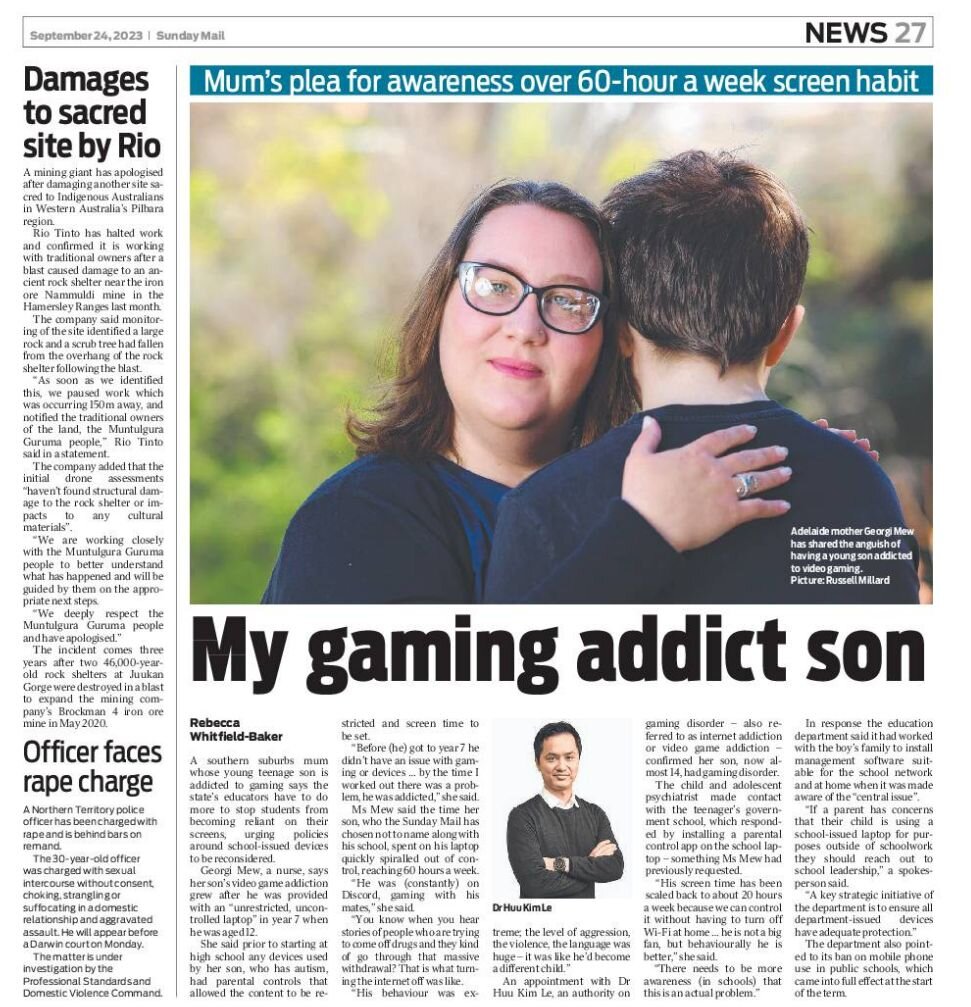
Dr Le
Articles
*Please note that at CGI Clinic we respect every family's confidentiality. This story was shared with the family's consent. It is very rare that Dr Kim would ask if a parent would like to speak to a journalist. We chose to share this story in order to help families and improve policies to protect children and their education. We ask that you be respectful and we are grateful to all families who share their journey so that others can be better informed.
‘By the time I worked out there was a problem, he was addicted’: Mum shares son’s gaming fixation
An Adelaide mum has shared the anguish of having a young son addicted to video gaming, detailing the role she believes his school played in allowing it to get out of control.
Rebecca Whitfield-Baker@baker_bec 2 min read September 27, 2023 - 10:19AM
Sunday Mail (SA)
A southern suburbs mum whose young teenage son is addicted to gaming says the state’s educators have to do more to stop students from becoming reliant on their screens, urging policies around school-issued devices to be reconsidered. Georgi Mew, a nurse, says her son’s video game addiction grew after he was provided an “unrestricted, uncontrolled laptop” in Year 7, when he was aged 12. She said before starting high school, devices used by her son – who has autism – had parental controls that allowed content to be restricted and screen time to be set.
“Before (he) got to year 7, he didn’t have an issue with gaming or devices … by the time I worked out there was a problem, he was addicted,” she said.
Ms Mew said the time her son, who the Sunday Mail has chosen not to name along with his school, spent on his laptop quickly spiralled out of control, reaching 60 hours a week. “He was (constantly) on Discord, gaming with his mates,” she said. “You know when you hear stories of people who are trying to come off drugs and they kind of go through that massive withdrawal? That is what turning the internet off was like.
“His behaviour was extreme; the level of aggression, the violence, the language was huge – it was like he’d become a different child.”
An appointment with Dr Huu Kim Le, an authority on gaming disorder – also referred to as internet addiction or video game addiction – confirmed her son, now almost 14, had gaming disorder. The child and adolescent psychiatrist made contact with the teenager’s government school that responded by installing a parental control app on the school laptop – something Ms Mew had previously requested.
“His screen time has been scaled back to about 20 hours a week because we can control it without having to turn off Wi-Fi at home … he is not a big fan but behaviourally is better,” she said. “There needs to be more awareness (in schools) that this is an actual problem.”
In response, the education department said it had worked with the boy’s family to install management software suitable for the school network and at home when it was made aware of the “central issue”.
“If a parent has concerns that their child is using a school-issued laptop for purposes outside of schoolwork, they should reach out to school leadership,” a spokesperson said. “A key strategic initiative of the department is to ensure all department-issued devices have adequate protection.”
The department also pointed to its ban on mobile phone use in public schools, which came into full effect at the start of the term.





